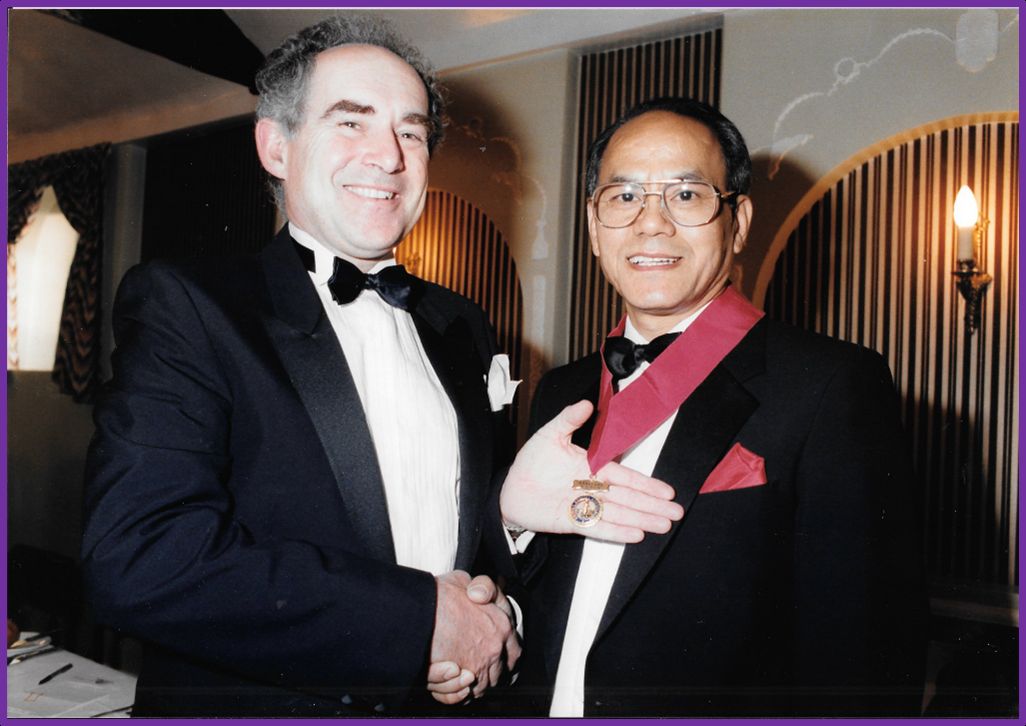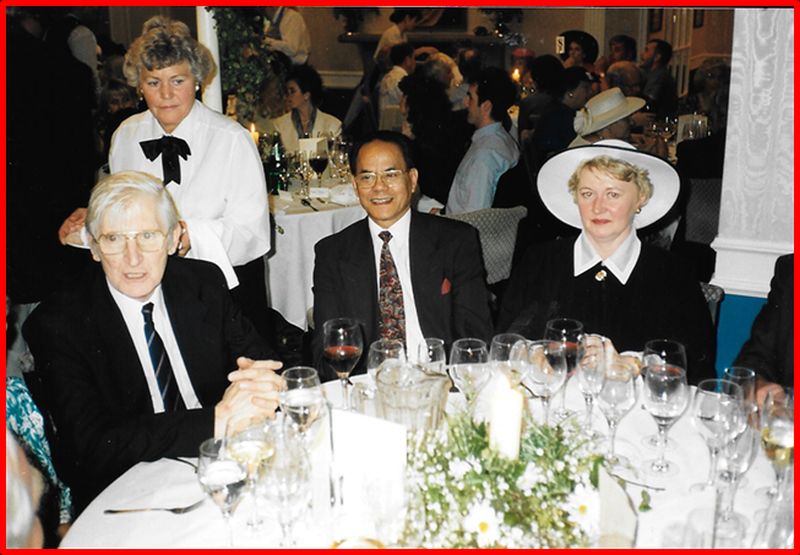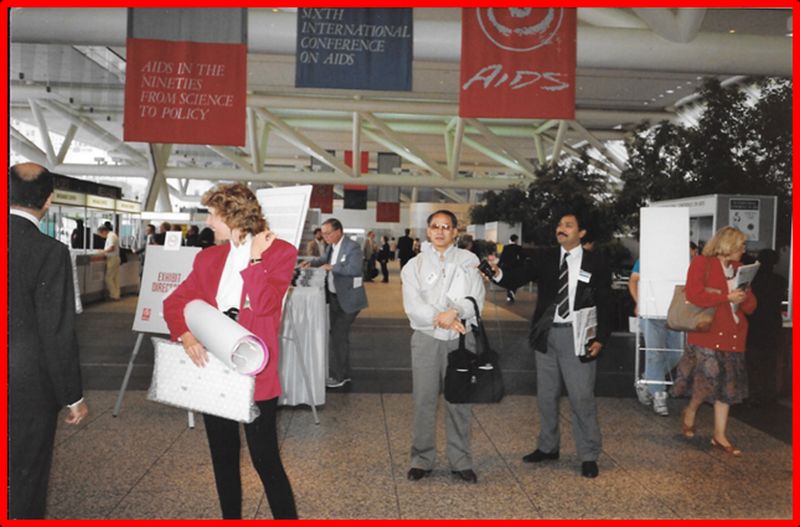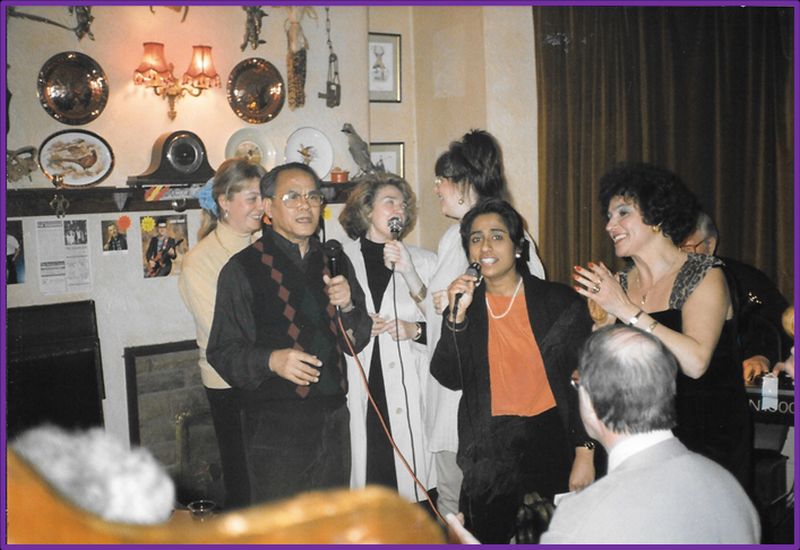Beginning of life in the United Kingdom for one of the pioneers of Manipuri emigrants overseas
- Fourth part of the book: Dr Mohendra's Memoir to be published -
Dr Mohendra Irengbam *

First Asian President of BMA, the City of Bradford and Airedale. June 12 1991
In the previous chapter I was preparing to go to London. It was still strange that I had now the chance after all, to discover a world that was only conceived in the imagination, and without trying to punch above my weight. The following story captured the zeitgeist of the time of my life. The story is a crude clash of time, space and people, when curiosity and impatience got the better of me. After so many years, I just about can muster the gumption to write the story.
Keeping pedagogical dogma aside, and having enough personal conviction to recognise the power of my gut instinct, one fine morning, with a hurriedly packed suitcase I left home for Calcutta en route to London. Sister Nienglen (from Churachandpur), who used to be my ward Sister at Civil Hospital in Imphal, came to see me off along with a host of my relatives.
I was consumed with happiness that wisps of light cloud moved across the plush darkness of my mental wellbeing and I could see the moon in the sky. I had now, the freedom to discover myself, to explore my limits to myself completely and without any interference. I did not have time to say goodbye to many near and dear ones.
On a mizzly February morning that was made luminous by a tendril of warm sunshine, I said goodbye to my parents before I left for Tulihal Airport to fly to Calcutta. My mother sitting on the verandah of our house, said to me: "Don't forget you left your father and mother at home, don't eat beef and don't marry a mem. Little did I envisage that I would 'fall in love' with an English girl (Mem) I met at my second job in a hospital in the town of Gateshead, near Newcastle, and that she would change the course of my life upside down?
In Calcutta, I bought a plane ticket for London via Zurich by the Swiss Airlines, from the Grand Hotel shopping corridor (Rs 75,000). I was allowed foreign exchange only for 5 Sterling pounds, which I collected from the Reserve Bank of India. One pound was equivalent to 10 rupees. I left Calcutta two days later, by an evening flight.
In Calcutta, I managed to get hold of a pair of long Johns and a woollen overcoat from a tailoring shop at Lyndsey Street, near the famous Park Street, off Chowringhee Road. I also met the late Sanjoy from Khurai Lairikyengbam Leikai, who was a veterinary surgeon. We spent one evening together with a half bottle of Vodka and orange juice [screwdriver] before I left for London.
I arrived in London on February 10 1966. London has always been an exciting place for me, since I read in Primary School how ships sail on the Thames River while trains run below it. London gi thames turel gi mathakta jahaj chatlaga makhadna train chelli. I wondered then, how it was possible!
I knew what it exactly meant after I came to London and travelled underground for the first time. Once, I travelled from Westminster underground station located by the side of the Parliament Building in the north of the River Thames to Wimbledon station in the south of the River. It passed across River Thames, through a tunnel dug under the riverbed. Part of this line is overgound train as it approached Wembley, but it is still called underground as it is part of the underground railway network.
![London Eye [The wheel] by the Westminster Bridge (green in front). On the other southern side of River Thames, Opposite Houses of Parliament. Westminster Underground Tube station is at the left end of the bridge and by the side of the Parliament House. The revolving Eye takes 30 minutes to wheel over 360 degrees. A seat in the air-conditioned green box costs £36 each at the moment.](http://www.e-pao.org/galleries/images/misc/2021/07/Mohendra_20210702_2.jpg)
London Eye [The wheel] by the Westminster Bridge (green in front). On the other southern side of River Thames, Opposite Houses of Parliament. Westminster Underground Tube station is at the left end of the bridge and by the side of the Parliament House. The revolving Eye takes 30 minutes to wheel over 360 degrees. A seat in the air-conditioned green box costs £36 each at the moment.
The morning in London when I arrived at Heathrow Airport, was slate-grey, frosty and miserable. It was about 10 in the Morning. By about 11 am after collecting my baggage from the carousal I came out to face the custom man. After looking at my work voucher, he asked how long I was going to stay in the UK. He didn't believe me when I said 3 or 4 years. I said, I only came here to work as a student. In any case, it was none of his business. He asked me to take off my newly purchased watch (a smuggled watch from Churachandpur) from my wrist. He looked at it and he must have realised it was not an expensive one.
He showed me a little card about the size of a playing card with printed writing on it. It read 'I have nothing to declare' and something else. I said no. He then directed me to see a doctor in a cubicle. The elderly doctor was quite nice knowing that I was a doctor and I came for postgraduate studies. We had a little chat and he dispensed from giving me a medical examination.
Coming outside the concourse, London was foggy and damp. The atmosphere was heavy with moisture. My breath hung in the chill air. It was freezing cold in spite of my great coat and leather gloves. The rain clouds grew darker and heavier as I got inside a typical rounded black London taxi or cab with 3 seats across in the back and 2 flip-down seats facing backwards.
Though I was quite used to Hill Stations in India, having lived in Darjeeling and Nainital, and having been to a few others, I found the atmosphere in level London rather daunting with the strangeness of a foreign country. People seemed to go about their life very quietly. There was no din and bustle, sweat and stench, of an Indian city I was used to. Every woman seemed to be wearing knee-length boots. That seemed to be the fashion in those days.

At a wedding reception
I gave the cab driver the address of a small Indian hostel, which Dr Jatiswar gave to me. It was somewhere in Russell Street. I remember reading a brochure before I came, of what to do or not to, while in London. So I did not forget to tip the driver a quarter of a pound (I had only 5 pounds in my pocket) and say thank you.
The owner of the hostel, an Indian, was none too happy, as he knew my money would have been limited to only 5 pounds. My spirit suddenly plummeted. I told him that I had more than 5 pounds and that I won't be staying there more than a couple of days. He allowed me to stay in a twin-bedded room with another Indian doctor from America.
Next morning, two of us went out by the tube (Metro) to Piccadilly Circus and walked to Trafalgar Square nearby [The centre of London], after he has been to The Royal London Hospital for his job interview. He has been here for a month. He was there for postgraduate studies as well. Somewhere at Soho near Piccadilly Circus, I telephoned Dr L Jogendra from a pay-phone outside. He asked me to come over where he was staying in Halifax in the north of England. He gave me the directions. Next morning I caught a train from Kings Cross – a major Railway Station for trains going to the north of London.
Dr Jogendra was a very talented and a good doctor. He was charming in his manners and always with a catching smile. Having done his MRCP, he was temporarily working as a resident doctor at a small Chest Hospital in Halifax, Yorkshire. He wanted sometime to decide where his future lay, here in the UK or in Manipur.
I found him living in luxury, in comparison to the standard of living we were used to India. Nicely furnished bedroom with en-suit bathroom, wall-to-wall deep pile carpet and a lounge with television and telephone. There were uniformed hospital maids to serve him bed-tea, lunch, evening tea with cakes, and dinner. 'Cleaner ladies'- house maids, came in the morning about 11 am to make his beds and clean the rooms and bathroom. And there was an attached guest room with attached bathroom, where I stayed.
In 3 or 4 days, by sheer luck, I got a job as a trainee Senior House Officer (SHO) in Anaesthetics at the Halifax Royal Infirmary, the same town as Dr Jogendra's. I had free lodging and boarding at the Doctors' Residence in the hospital compound. The monthly pay was about 68 pounds. I finally overcame the demons that contributed to my anxiety. Thus, began my life in the United Kingdom.
The residential accommodation was not as grand as Dr Jogendra's, but the services were the same. Each morning at 8 am, a maid would come to my room and wake me up with a cup of tea, saying "Good morning Dr Singh". And I would be ready for breakfast. After breakfast in the Dining room I would go to the Operating Theatre by 10 am. In the evening, another maid would come to prepare the bed. She would remove the cover sheet and flip over the top end of the blanket over the quilt. It was like a 5 Star hotel.
The lunch and dinner had 3 course meal with a pudding, now called dessert (American). There were fruit or tomato juice for drinks. English people do not drink water with food. Evening tea was served with a variety of cakes and pastries in the Doctors' Common Room with a television at 6 pm.
As a routine for an anaesthetic junior doctor, I had to go to surgical wards in the evenings, for a cursory cardio-vascular examination and premedication of patients for next morning's operations. The first night I was shocked to find a 17 year old girl in the female ward, lying completely naked and wearing a see-through gown. I was embarrassed (not her or any other older woman patient) and so I avoided physical examination of her and left the premedication tablets for her to take.
Dr Jogendra from Kongba Bazaar was a very a popular doctor. He practised in Imphal from a Clinic at Makha Dukan (Paona Bazaar). A few years after I came to Imphal to work as a doctor in Civil Hospital, his practice was thriving. He was talking about going to UK and that I should follow him. I let his words percolate through my brain. Such a relentless road was going to take me through unchartered world beyond me and within me.
He went as a student like others from Imphal. I would be going as a working doctor. True to his words, he wrote a couple of letters asking me to come over, after he had settled there. First, I was dilly-dallying. In the end I did go to London. I remain very grateful to him for his moral support.
Rather than time, focus on my past events in Great Britain, which some of my photos can tell the story about who I am, I have made a conscious choice of writing a bit about London, which for Joe Bloke, is United Kingdom. I will leave to readers to plumb the depth of my struggle that determined the height of my success. I will also touch briefly on the change in the British socio- economy. That after WWII, the UK was no longer a great military or economic power. And the bankrupt country was entering a post-war decline while embracing liberalism and tolerance with the mass influx Asian and afro-Caribbean people.
The city of London is not as spectacular as Paris or Rome, but it is steeped in the history of British Imperialism, which made it a very prosperous city. Britain has probably had a bigger influence on the modern world than any other nation, aside from the English language that is spoken in 67 countries in the world.
London came from Londinum or Roman London, which was the capital of Roman Britain, which began to decline in 410 CE. London is among the oldest of the world's great cities. Its history spans two millennia, and is one of the most cosmopolitan. All sorts of people live in London, including thousands of asylum seekers.
Apart from the Buckingham Palace, and the Tower of London where they used to behead famous people with an axe, including two wives of Henry VIII, Parliament building is amongst the best tourist attractions in London.
London, the capital of the United Kingdom, has two parts: (1) City of Westminster, the political centre where Parliament and Downing Street are located, and City of London, the financial centre. The building that houses both Parliaments in their traditional Gothic style, with its tall Big Ben Tower, is known as the Palace of Westminster. It is the physical form of the British Constitution and British political life.

Author as Delegate to the First International Conference for AIDS in San Francisco
With Dr Mohante from Odisha
London's famous landmark are Houses of Parliament with its Big Ben clock that has four clock faces. This is as well-known as the Taj Mahal in Agra or the Eiffel Tower in Paris. Piccadilly Circus and Trafalgar Square are in the centre of London and Soho is the heart of London's night life scene. Here you can spends thousands of pounds in one night or, could be cheated of thousands of pounds. Oxford Street is the great Shopping Centre.
There are several double-decker red London buses that route past the Tower of London and the Parliament Building. Westminster Pier, located beside Westminster Bridge, is a major destination for all visitors to London. It is served by a number river buses the ply on River Thames. The Underground Tube train station is also by the Westminster pier.
The story about the London's underground has always been a hallmark of London city life. The underground or tube in London (Subway or Metro) is the oldest transport system of its kind in the world. It opened on 10th January 1863 with steam locomotive.
Thousands that commute to their offices or work places every day, are always in a hurry. They will never smile or talk and often read a pocket book. Those who talk a bit are always foreign visitors. Some of them would rush up and down the escalator on the left side, as the passengers are notified to stand on the right.

Author singing in the local pub: (Country Road take me home ...) with 5 friends
Another trademark of London is its centuries-old pubs or public drinking (alcohol, popularly beer) places. London is full of pubs. An English pub is an integral part of British life, especially student life. The latter sounds an anti-thesis to the student life we know in India. Students who go to University must have a budget between 2-3 thousand pounds a year for alcohol on top of the cost for lodging and boarding. Education is free.
Pubs became a very important part of British culture during both the world wars. Compared to the bar in America, British pub has a culture and charm of its own. It is a meeting place, where you go to socialise, a bit like tea-hotels in Imphal. The atmosphere is created to relax and chat. It is an egalitarian place where people drink mostly beers. Britain had its own beers known as Bitters. Ale was the beer before Roman Times in Britain. The pubs now, serve Bitter, as well as European Lagers since the 70s. It also serves other drinks like Whiskies, Gins, Brandies, Tequilas, etcetera, as well as soft drinks.
You can have some snacks with your drinks. Many pubs serve food as a restaurant as well. Working men's pubs (subsidised by the government and thus cheaper drinks) have games like Darts, snookers etc. Some pubs have sing-songs like I was doing in the photograph at my local pub. A pub is where you learn British culture. You don't have to drink alcohol, but it is better if you do. Alcohol makes you unwind and loosen your tongue. You then become 'one of the lads'.
London has 3,500 pubs. So you can never run out of watering holes wherever you are in London. They are always crowded with visitors. It seems, rather surprisingly that British etiquettes barred women from entering pubs before WWII, though during the War they had women staff as men had to go to war. It was only after WWII that women began going to the pubs accompanied by men. Even now women rarely go to the pub by themselves, as they will be regarded as 'available' ie loose women. Customs have now changed as it has anywhere for women in the world. Still single woman does not go to the pub alone.
Likewise, wearing trousers or slacks by women before WWII was looked down my men though Hollywood movie stars Katharine Hepburn and Marlene Dietrich were often seen wearing them.
Before WWI, life of British women was traditionally for domestic responsibilities. During WWl, one million women were allowed to join the workforce, to fill the gap left by men. During WWll, between 1941 and 1943, almost 90% of single women and 80% of married women were working in factories and Armed forces.
My life, since my arrival in the UK in the mid-sixties, has changed a lot in smarter living and etiquettes but my core personality trait has remained unchanged over the last half-century.
Having narrated about the British pub culture and a smidgen of British life, I would like to end this piece today, with one of the best poems written by the Bard Of Scotland, Robert Burns, who is immortal for the song 'Auld Lang Syne' that is sung at the stroke of midnight on New Year's Eve, all over the English speaking countries. Robbie Burns was quite a drinker himself.
The poem is about the Scottish culture of drinking whiskies. It is an epic poem 'Tam 'O Shanter'. It describes the story of an intoxicated happy Scot at a beautiful seaside Scottish town of Ayr.
And thirsty neighbours, neighbours meet;
As market days are wearing late,
And folk begin to take the road home,
While we sit boozing strong ale,
And getting drunk and very happy.
The theme of the poem exhorts everyone that life is ephemeral. Life is hard pressed to enjoy and appreciate the good things of the earth. And human pleasure is fleeting and it is all the more precious. Pleasures are like poppies spread, you seize the flower its bloom is shed. Or like the snow that falls in the river, a moment white – then melts forever.
Author's website: drimsingh.com
* Dr Mohendra Irengbam wrote this article for e-pao.net
The writer can be contacted at irengbammsingh(AT)gmail(DOT)com
This article was webcasted on July 02 2021 .
* Comments posted by users in this discussion thread and other parts of this site are opinions of the individuals posting them (whose user ID is displayed alongside) and not the views of e-pao.net. We strongly recommend that users exercise responsibility, sensitivity and caution over language while writing your opinions which will be seen and read by other users. Please read a complete Guideline on using comments on this website.








